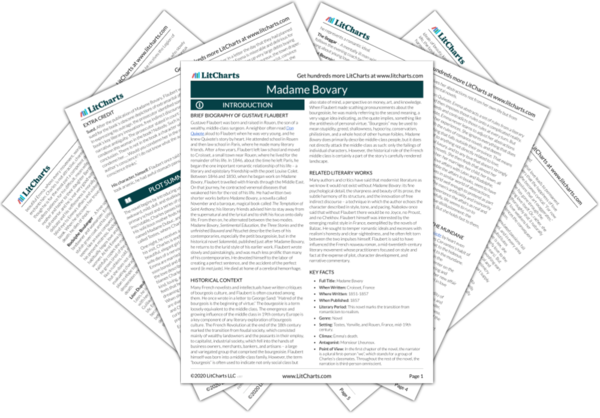Summary
Analysis
The Wednesday of the ball, Emma and Charles drive at the magnificent château. Emma is deeply impressed by the spaciousness, the marble, the imposing line of portraits on the walls, the smell of flowers and the sounds of crystal. She observes that some of the women do not put their gloves into the wine glasses, meaning they will not abstain from alcohol. She notices the Marquis’s father-in-law, a famous adventurer and former lover of Marie-Antoinette’s, who now sits frightening and decrepit.
For the first time in her life, Emma finds herself in a place that does – to an extent – resemble the world of the books. It is a superficial resemblance, because Emma knows nothing of the life that takes place there. But Emma always infers values from appearances; she believes that a beautiful exterior always indicates something of great value, though she does not quite know what something is.
Themes
Emma dresses beautifully for dinner, crossly warning Charles not to try to dance with her. She comes down to the ballroom and performs a quadrille, a dance that excites her by its graceful exchange of partners. She notices a dispersed group of men that all have a certain something in common: they have the clothes, the complexions, and the “peculiar brutality” of great wealth. She overhears enchanting, mysterious conversations about faraway places and expensive racehorses.
The château’s guests further confirm Emma’s blurry ideas about the good life. Their lives seem exciting and refined. But, ultimately, Emma is admiring wealth and nothing else: the good looks of wealth, the emotional complacence of wealth, and the pastimes of wealth. She thinks she is observing a refinement of mind and emotion, but it is only refinement of acquisition.
Themes
Emma notices peasants at the windows looking in at the brilliant scene, and remembers her own rural childhood at Les Bertaux. Dazzled by the ball’s splendor, she hardly feels as though that childhood happened at all: it seems to be fading by the minute. An exquisite dinner is served. At 3 AM, the remaining guests begin to waltz. A mysterious man known as the Viscount invites Emma to dance. He dances beautifully, and soon Emma is exhausted and enraptured. From her seat, he watches him dance with another beautiful woman, more skilled in dancing than Emma. Soon, the guests go to their rooms to sleep.
Because Emma lives through fantasy, not experience, her past life easily falls away from her. She has formed no attachments to it, to its people, places, or values: she has only attached herself to the people and places of her books. The Vaubyessard ball is all she needs to cement her fantasies, to confirm their significance and supreme importance. The vagueness of the experience, its lack of detail or human meaning, is only another way the experience mirrors the novels.
Themes
The following afternoon, Emma and Charles set out for home. As Emma sits languishing in their carriage, she thinks she sees the Viscount and another man ride by on horseback. Emma and Charles find a green silk cigar-case, probably belonging to one of the men. When they arrive at Tostes, Emma fires her maid for some perceived rudeness. Charles begins to smoke one of the stranger’s cigars, but Emma takes the case away and hides it. She spends her days reminiscing sadly about the ball.
Vagueness appeals to Emma for good reason. It allows her to worship something without really knowing it; knowledge always reveals flaws, ambivalence, complications, and Emma has no stomach for such things. She wants the things she loves to be simple and perfect. Therefore, she prefers the unknown: the Viscount without a name or face, the real life shrouded in mystery.
Themes
Get the entire Madame Bovary LitChart as a printable PDF.













